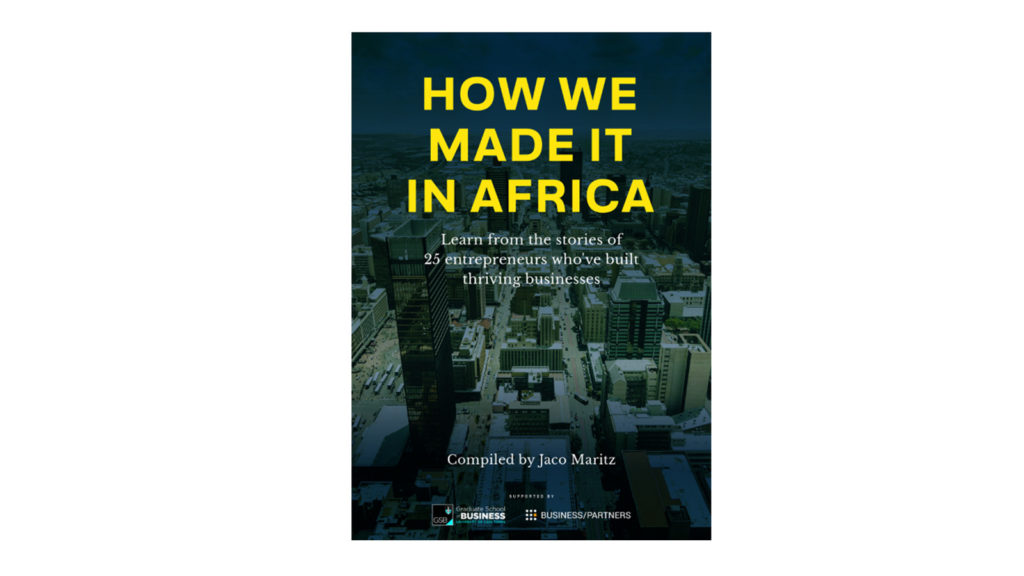LG’s 100-Inch QNED evo AI TV Redefines Big-Screen Viewing in South Africa In a bold leap forward for home entertainment, LG Electronics South Africa…
Entrepreneurs tell how they grew thriving business in ‘How we made it in Africa’

Running your own company is an intense roller coaster ride, where the highs are high, and the lows debilitatingly low. Sometimes, it helps to see just how other entrepreneurs have tackled being a business owner.
A new book, How we made it in Africa, tells the stories of 25 top African entrepreneurs who’ve built thriving businesses on the continent.
The book — compiled by Jaco Maritz, the founder of web business publication How we made it in Africa — was released earlier this month in Cape Town. It details the experiences of some of Africa’s most dynamic entrepreneurs, providing insight into the continent’s business opportunities.
The book is published by Maritz Africa — the company behind How we made it in Africa — in association with business financier Business Partners and the UCT Graduate School of Business.
‘How we made it in Africa’ details the experiences of Africa’s most dynamic entrepreneurs, providing insight into the continent’s business opportunities
Here are some lessons from the business people featured in the publication on how to grow a startup into a flourishing enterprise.
1.Know why you are doing what you’re doing
When starting out, most entrepreneurs typically have a rough idea of where they want to take their businesses. But as they are confronted with real-world realities, vision and mission statements quickly become little more than public relations (PR) tools and words on their company’s website.
However, for Ken Njoroge, co-CEO of pan-African digital payments business Cellulant, his original vision remains front and centre of everything the company does, even over 15 years after starting the business.
In fact, Njoroge and his co-founder, Bolaji Akinboro, decided on a goal before they were even 100% certain through which type of business they would achieve it.
Their vision is to build a $1-billion company (a goal the two still aspire to achieve). They didn’t pick this goal because they were particularly interested in driving Maseratis. No. To them it symbolised something bigger. It was to demonstrate that it is possible to build a world-class company in Africa without political connections or paying bribes.
Njoroge says it is crucial that entrepreneurs take the time to formulate the why of their business, as it will drive all their decisions, from who to employ to what processes to put in place.
2. Focus on growing the business, not on day-to-day operational tasks
Tumi Phake, founder of SA health club operator Zenzele Fitness, says building a company with the potential to scale is a conscious decision an entrepreneur should take right at the start.
He contrasts this with a “sole proprietor approach”, such as a restaurateur who is happy to have one restaurant where they spend all their time and know most patrons by name. To build a large company, entrepreneurs need to spend their time thinking about expanding the business, not on day-to-day operational issues.
He illustrates his point by telling of a would-be entrepreneur who pitched an idea for a spa business at an entrepreneurship event.
“There are spas all over the place. What will make yours unique?” Phake asked her. “Because I give the best massages, like no one in the world,” she replied.
He asked what would happen when she has five spas? Will she run from the one to the other to massage clients? She replied: “Oh, no, I will train my staff, but I still want to be the best.”
“What I tried to say to her was that she, as the business owner, has to give the worst massages of everyone working there.
“You have to train your people to be the best because they have to do the job for you. As the owner, you have to think about growing the business and not massage people the whole day. If you do, it is all you will ever do and the company will never grow,” he explains.
3. All stakeholders should have skin in the game
All stakeholders in a business transaction must be aligned and have skin in the game if it is to succeed.
Nigerian entrepreneur and investor Chijioke Dozie, founder of digital financial services firm OneFi, learnt this after investing in a distressed company where the owner didn’t have the same incentive as his investors to see the business succeed — either way, he was to make money from the deal.
“We made the mistake of going into a few such transactions because they were new and exciting, and we had a sort of deal lust. In every single one of those situations we lost money,” Dozie explains.
4. Don’t launch new products before the current ones are well-established
Entrepreneurs shouldn’t introduce new products or services until their current offerings are well established.
Fortunately, Rwanda’s Jean de Dieu Kagabo learnt this early on. His company, Soft Group, started out by manufacturing toilet paper. However, with his toilet-paper business still in its baby shoes, Kagabo wanted to diversify, and began producing detergents.
This was a mistake. The detergents sold well but Kagabo didn’t fully appreciate how expensive the imported raw materials would be. It forced him to dip into the money intended for the toilet paper side of the business, which meant his original product suffered.
With 20/20 hindsight, he says that when developing a business plan for a particular product, entrepreneurs need to have a clear idea of the size of the market they are targeting. And if that opportunity is large enough, they should stick with that one product until it can stand on its own feet before branching out.
“Focus on one thing until it can sustain itself. Luckily I discovered this at a young age, so I stopped with the detergents, and focused on the toilet paper,” he says.
5. No amount of advertising can sell a bad product
Nana Akua Birmeh is the founder of one of Ghana’s most successful architecture firms, ArchXenus. However, her company faced a unique challenge: Architecture firms, like law firms and private attorneys, are not allowed to advertise or market their services in Ghana. Her response was to let her buildings do the advertising for them.
“Isn’t a building a far bigger billboard than any other? I want people to drive by a building or visit a place and be compelled to ask, ‘Who designed this?’ If someone wants to, they will fish you out wherever you are,” she says.
For Birmeh, that is the best path to success for entrepreneurs, regardless of the sector they’re in or whether they’re allowed to advertise or not.
“To attract new clients, the fundamental thing is the product. You can hire the best ad agency in the world, but if what you offer is no good, the result of the advertising effort will be nil. Let your work speak for itself,” she explains.
The ebook is available from book.howwemadeitinafrica.com and Amazon

